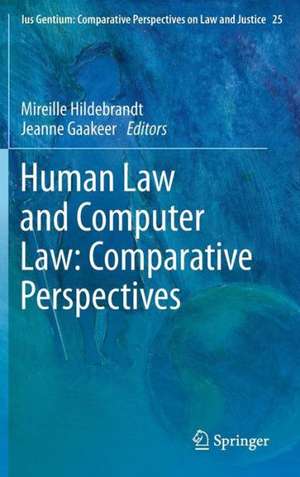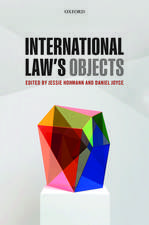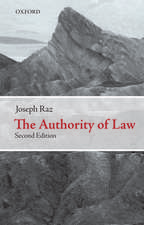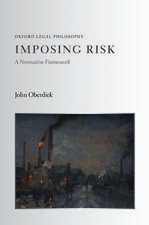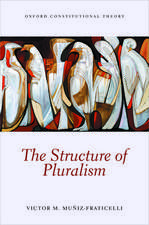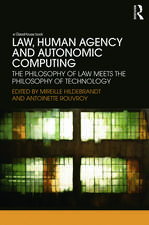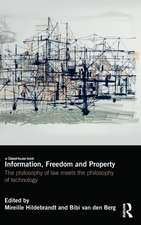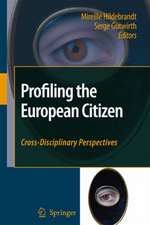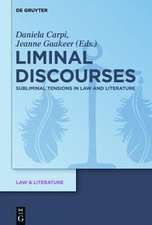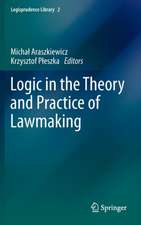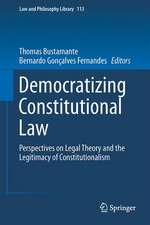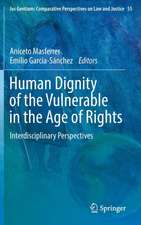Human Law and Computer Law: Comparative Perspectives: Ius Gentium: Comparative Perspectives on Law and Justice, cartea 25
Editat de Mireille Hildebrandt, Jeanne Gaakeeren Limba Engleză Hardback – 5 iun 2013
| Toate formatele și edițiile | Preț | Express |
|---|---|---|
| Paperback (1) | 636.30 lei 6-8 săpt. | |
| SPRINGER NETHERLANDS – 23 iun 2015 | 636.30 lei 6-8 săpt. | |
| Hardback (1) | 642.51 lei 6-8 săpt. | |
| SPRINGER NETHERLANDS – 5 iun 2013 | 642.51 lei 6-8 săpt. |
Din seria Ius Gentium: Comparative Perspectives on Law and Justice
- 20%
 Preț: 1128.14 lei
Preț: 1128.14 lei - 20%
 Preț: 1565.15 lei
Preț: 1565.15 lei - 18%
 Preț: 1115.28 lei
Preț: 1115.28 lei - 18%
 Preț: 904.28 lei
Preț: 904.28 lei - 18%
 Preț: 1001.81 lei
Preț: 1001.81 lei -
 Preț: 180.18 lei
Preț: 180.18 lei - 24%
 Preț: 787.30 lei
Preț: 787.30 lei - 18%
 Preț: 1115.28 lei
Preț: 1115.28 lei - 15%
 Preț: 635.31 lei
Preț: 635.31 lei - 18%
 Preț: 1108.67 lei
Preț: 1108.67 lei - 18%
 Preț: 1007.97 lei
Preț: 1007.97 lei - 18%
 Preț: 784.79 lei
Preț: 784.79 lei - 18%
 Preț: 1223.11 lei
Preț: 1223.11 lei - 18%
 Preț: 891.02 lei
Preț: 891.02 lei - 18%
 Preț: 1009.40 lei
Preț: 1009.40 lei - 18%
 Preț: 1005.74 lei
Preț: 1005.74 lei - 18%
 Preț: 1014.89 lei
Preț: 1014.89 lei - 18%
 Preț: 896.70 lei
Preț: 896.70 lei - 15%
 Preț: 641.85 lei
Preț: 641.85 lei - 18%
 Preț: 779.71 lei
Preț: 779.71 lei - 18%
 Preț: 1010.79 lei
Preț: 1010.79 lei - 18%
 Preț: 1010.03 lei
Preț: 1010.03 lei - 18%
 Preț: 950.52 lei
Preț: 950.52 lei - 15%
 Preț: 638.76 lei
Preț: 638.76 lei - 18%
 Preț: 947.50 lei
Preț: 947.50 lei - 20%
 Preț: 564.76 lei
Preț: 564.76 lei - 18%
 Preț: 1115.14 lei
Preț: 1115.14 lei - 18%
 Preț: 944.82 lei
Preț: 944.82 lei - 15%
 Preț: 635.80 lei
Preț: 635.80 lei - 15%
 Preț: 637.59 lei
Preț: 637.59 lei - 15%
 Preț: 643.65 lei
Preț: 643.65 lei - 24%
 Preț: 809.15 lei
Preț: 809.15 lei
Preț: 642.51 lei
Preț vechi: 755.88 lei
-15% Nou
Puncte Express: 964
Preț estimativ în valută:
122.96€ • 127.64$ • 102.53£
122.96€ • 127.64$ • 102.53£
Carte tipărită la comandă
Livrare economică 25 martie-08 aprilie
Preluare comenzi: 021 569.72.76
Specificații
ISBN-13: 9789400763135
ISBN-10: 9400763131
Pagini: 212
Ilustrații: VIII, 202 p.
Dimensiuni: 155 x 235 x 20 mm
Greutate: 0.48 kg
Ediția:2013
Editura: SPRINGER NETHERLANDS
Colecția Springer
Seria Ius Gentium: Comparative Perspectives on Law and Justice
Locul publicării:Dordrecht, Netherlands
ISBN-10: 9400763131
Pagini: 212
Ilustrații: VIII, 202 p.
Dimensiuni: 155 x 235 x 20 mm
Greutate: 0.48 kg
Ediția:2013
Editura: SPRINGER NETHERLANDS
Colecția Springer
Seria Ius Gentium: Comparative Perspectives on Law and Justice
Locul publicării:Dordrecht, Netherlands
Public țintă
ResearchCuprins
Acknowledgements; Mireille Hildebrandt and Jeanne Gaakeer.- Prefatory remarks on Human Law and Computer Law; Mireille Hildebrandt.- Part I − Law and Code.- 1 Prefatory remarks to part I: law and code; Mireille Hildebrandt.- 2 From Galatea 2.2 to Watson – and back?; Mireille Hildebrandt .- 3 What robots want: autonomous machines, codes and new frontiers of legal responsibility; Ugo Pagallo.- 4 Abort, retry, fail: scoping techno-regulation and other techno-effects; Bibi van den Berg and Ronald Leenes.- 5 A bump in the road. Ruling out law from technology; Katja de Vries and Niels van Dijk.- Part II − Law and Literature.- 6 Prefatory remarks to part II: law and literature; Jeanne Gaakeer.- 7 Control, Alt and/or Delete? Some observations on new technologies and the human; Jeanne Gaakeer.- 8 Law, normativity and the writing. Oracle Night and Human indeterminacy; Massimo Durante.- 9 When a robot can love - Blade Runner as a cautionary tale on law and technology; Shulamit Almog.- About the authors.- Index.
Textul de pe ultima copertă
The focus of this book is on the epistemological and hermeneutic implications of data science and artificial intelligence for democracy and the Rule of Law. How do the normative effects of automated decision systems or the interventions of robotic fellow ‘beings’ compare to the legal effect of written and unwritten law? To investigate these questions the book brings together two disciplinary perspectives rarely combined within the framework of one volume. One starts from the perspective of ‘code and law’ and the other develops from the domain of ‘law and literature’. Integrating original analyses of relevant novels or films, the authors discuss how computational technologies challenge traditional forms of legal thought and affect the regulation of human behavior. Thus, pertinent questions are raised about the theoretical assumptions underlying both scientific and legal practice.
Caracteristici
Offers a new direction in interdisciplinary legal studies law and code and that of law and literature The first volume to bring together theoretical reflection on new technologies and contemporary literary-legal theory Confronts two interdisciplinary fields within legal theory: that of law and code and that of law and literature ?
